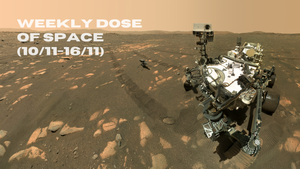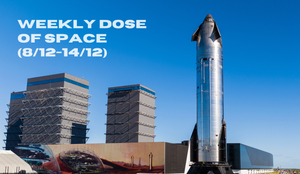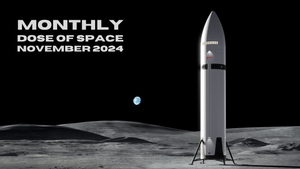
Weekly Dose of Space (10/11-16/11)
Welcome back to Weekly Dose of Space! This week had seven orbital launches occur, with the majority of them carrying Starlink satellites. News this week had China deliver supplies to its space station, New Glenn awarded a launch contract, and JPL laying off part of its workforce.
SpaceX
This week at Starbase began on November 11th when the water deluge system was activated as part of a test ahead of flight six. That night Ship 31 was rolled out from the production site to the launch site, after arriving it was parked near the Orbital Launch Mount.
A few days later on November 14th, Booster 13 was also rolled out from the production site to the launch site. Shortly after arriving at the launch site, Booster 13 was lifted onto the Orbital Launch Mount, hopefully for the final time ahead of flight.
The next day, November 15th, Ship 31 was lifted on top of Booster 13, fully stacking the flight six Starship-Super Heavy vehicle. Booster 13 also performed a grid fin 'wiggle' to test their movement ahead of flight. The Orbital Launch Mounts detonation suppression system was also tested on the fifteenth.
Installation of the flight termination system explosives was believed to have been completed on November 16th. These explosives are placed on Ship 31 and Booster 13 to quickly terminate the flight in case of an anomaly.

Launches This Week
November 11th - Kinetica-1 with 15 payloads
CAS Space's fifth Kinetica-1 launch began this weeks launches carrying fifteen payloads into sun-synchronus orbit using a 3.35-diameter fairing for the first time. The payloads onboard were Jilin-1 Gaofen 05B for a high-resolution imaging technology demonstration, Jilin-1 Pintai 02A03 for optical remote-sensing, Xiguang-1 04 for methane monitoring, Xiguang-1 05 for hyperspectral remote sensing, Oman's Intelligent Remote Sensing Satellite-1, six Yunyao-1 meteorological satellites, and three Shiyan-26 technology demonstration satellites.

November 11th - Falcon 9 with Koreasat 6A
SpaceX launched the Koreasat 6A satellite to geostationary transfer orbit atop of a Falcon 9 from Launch Complex 39A, in Florida. Supporting this launch was booster B1067, on its twenty-third mission and landing back at Landing Zone 1.

November 11th - Falcon 9 with Starlink Group 6-69
A batch of twenty-four Starlink satellites were delivered to low Earth orbit atop of a Falcon 9 flying from Space Launch Complex 40, in Florida. This launch was supported by booster B1080, flying for the twelfth time and landing on the drone ship 'A Shortfall Of Gravitas' downrange.

November 13th - Long March 4B with Haiyang-4 01
A Long March 4B blasted off from Launch Complex 9 at the Taiyuan Satellite Launch Center carrying the Haiyang-4 01 satellite into sun-synchronous orbit. The Haiyang-4 01, also called Ocean-4 01, satellite will support ecological forecasting, water-cycle monitoring, marine environmental forecasting, short-term climate prediction, and global climate change research.

November 14th - Falcon 9 with Starlink Group 9-11
Another batch of twenty Starlink satellites were launched from Space Launch Complex 4E, in California, atop of Falcon 9. Booster B1082 supported this mission for its eighth flight, and landed downrange on the drone ship 'Of Course I Still Love You'.

November 14th - Falcon 9 with Starlink Group 6-68
Twenty-four more Starlink satellites were launched atop of Falcon 9 to low Earth orbit from Space Launch Complex 40. Supporting this launch was booster B1076 for its eighteenth flight, with a landing on the drone ship 'Just Read The Instructions' downrange.

November 15th - Long March 7 with Tianzhou-8
A Long March 7 lifted off from Launch Complex 201 at the Wenchang Space Launch Site carrying the Tianzhou-8 cargo resupply spacecraft into low Earth orbit, where the spacecraft began to chase down the Tiangong Space Station afterward.

In Other Space News
Tianzhou-8 docks to China's space station

A little over three hours after launch on November 15th, the Tianzhou-8 cargo resupply spacecraft docked at the aft docking port of the Tianhe core module of China's Tiangong Space Station, at 18:32 pm Universal Coordinated Time.
Onboard the spacecraft are clothes, food, and other consumables to support the Shenzhou-19 and Shenzhou-20 crewed missions. Also onboard are gift packages for Spring Festival, Mid-Autumn Festival, and Dragon Boat Festival as well as birthday gifts for some of the crew, believed to be Wang Haoze (王浩泽) and Cai Xuzhe (蔡旭哲).
Lunar brick samples are also onboard to test their thermal and mechanical performance as well as the impacts of cosmic radiation. If these tests are successful a new material will be available for construction on the lunar surface. The first brick is expected to return for study toward the end of 2025.
Other scientific experiments onboard are in the fields of materials science, microgravity fluid physics, space life, and biotechnology. A total of thirty-six experiments are being delivered, massing a total of 458 kilograms.
AST SpaceMobile to launch on New Glenn
AST SpaceMobile stated on November 14th that it had booked an undisclosed number of launches on Blue Orign's New Glenn launch vehicle to deploy its Block 2 BlueBird satellites.
The launches of Block 2 BlueBird satellites aboard New Glenn are expected in 2025 and 2026 carrying eight satellites within the rockets seven meter diameter fairing. New Glenn's launch schedule after its maiden flight in the coming weeks is somewhat vague, other customers for the rocket are Telesat Lightspeed, Amazon’s Project Kuiper, Eutelsat Communications, among others, possibly restricting launch opportunities of BlueBird satellites.
Between 45 and 60 Block 2 satellites are needed for AST SpaceMobile's space-based cellular broadband constellation to provide coverage over the United States. Other launch providers are also contracted to launch Block 2 BlueBird satellites, with one satellite for launch on India's GSLV and eight satellites on two of SpaceX's Falcon 9.
JPL cuts 5% of its workforce
NASA's Jet Propulsion Laboratory (JPL) announced on November 12th that it was cutting five percent of its workforce due to funding constraints. The five percent reduction will have 325 people laid off from JPL.
Laurie Leshin, JPL's Director, wrote the following about the layoffs:
"Despite this being incredibly difficult for our community, this number is lower than projected a few months ago thanks in part to the hard work of so many people across JPL. The workforce assessment conducted as part of this process has been both extensive and thorough, and although we can never have perfect insight into the future, I sincerely believe that after this action we will be at a more stable workforce level moving forward."
This is also the second time this year that JPL has had to cut its workforce. Back in February 530 employees were let go. JPL is now left with approximately 5,500 employees having reduced its total workforce by roughly 1/8th.
What to Expect Next Week
Starbase
SpaceX is targeting the launch of its sixth flight test of its Starship-Super Heavy launch vehicle no earlier than November 19th. This flight test will utilize Ship 31 and Super Heavy Booster 13 to repeat the booster catch and possibly perform an in-space Raptor relight.
November 17th - Falcon 9 with Optus-X
A Falcon 9 is expected to launch from Launch Complex 39A carrying the Optus-X satellite to a geostationary transfer orbit.
November 18th - Falcon 9 with Starlink Group 9-12
A batch of Starlink satellites is expected to launch from Space Launch Complex 4E atop of a Falcon 9.
November 18th - Falcon 9 with GSAT-20
Another Falcon 9 is expected to launch from Space Launch Complex 40 carrying the Indian GSAT-20 communications satellite to a geostationary transfer orbit.
November 19th - Starship-Super Heavy for flight test six
SpaceX is planning to conduct its sixth flight test of its Starship-Super Heavy launch vehicle using Ship 31 and Booster 13 from its launch site in south Texas.
November 20th - HASTE with Leidos-2
Rocket Lab is believed to be conducting a HASTE launch from Launch Complex 2, in Virginia, on behalf of Leidos and Dynetics. HASTE, Hypersonic Accelerator Suborbital Test Electron, is a suborbital version of the company's Electron launch vehicle.
November 21st - Soyuz 2.1a with MS-29
The Progress MS-29 mission is expected to lift off from the Baikonur Cosmodrome atop of a Soyuz 2.1a and head to the International Space Station.
November 21st - Falcon 9 with Starlink Group 6-66
Yet another Falcon 9 is expecting to launch a batch of Starlink satellites to low Earth orbit from Space Launch Complex 40.
November 23rd - Electron for 'Ice AIS Baby'
Electron is expected to launch five Internet of Things satellites to low Earth orbit, from Launch Complex 1 on the Māhia Peninsula, on behalf of the French company Kinéis.




